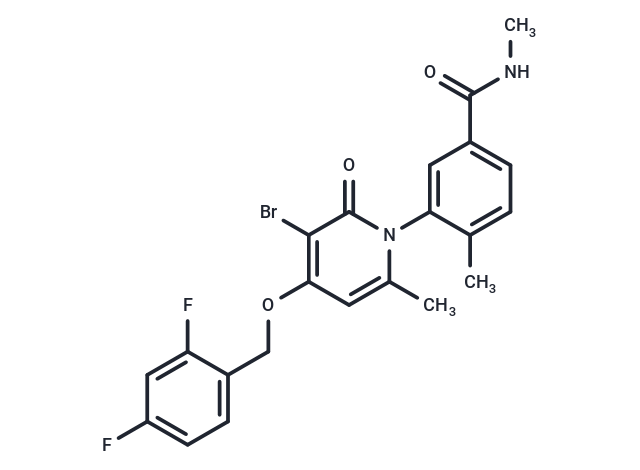Shopping Cart
- Remove All
 Your shopping cart is currently empty
Your shopping cart is currently empty

PH-797804 is a pyridinone inhibitor of p38α (IC50: 26 nM, in a cell-free assay); 4-fold more selective versus p38β and does not inhibit JNK2.

| Pack Size | Price | Availability | Quantity |
|---|---|---|---|
| 1 mg | $38 | In Stock | |
| 5 mg | $95 | In Stock | |
| 10 mg | $147 | In Stock | |
| 25 mg | $268 | In Stock | |
| 50 mg | $428 | In Stock | |
| 100 mg | $662 | In Stock | |
| 500 mg | $1,390 | In Stock | |
| 1 mL x 10 mM (in DMSO) | $98 | In Stock |
| Description | PH-797804 is a pyridinone inhibitor of p38α (IC50: 26 nM, in a cell-free assay); 4-fold more selective versus p38β and does not inhibit JNK2. |
| Targets&IC50 | p38β:102 nM, p38α:26 nM |
| In vitro | PH-797804 exhibits strong anti-inflammatory activity and is effective in treating arthritis induced by streptococcal cell walls and collagen in both mice and rats. A 10-day treatment regimen significantly reduces joint inflammation and associated bone loss. In human endotoxin challenge models, PH-797804 dose- and concentration-dependently inhibits the induction of IL-6, TNF-α, and MK-2 activities by lipopolysaccharides. Oral administration of PH-797804 effectively suppresses acute inflammatory responses induced by systemic administration of endotoxin in rats and crab-eating macaques, with an ED50 of 0.07 and 0.095 mg/kg, respectively. |
| In vivo | PH-797804 exhibits an IC50 value higher than 200 μM against several targets, including CDK2, ERK2, IKK1/2, IKKi, MAPKAP2/3, MKK7 (>100 μM), MNK, MSK (>164 μM), PRAK, RSK2, and TBK1. In the human monocytic U937 cell line, PH-797804 blocks the production of TNF-α and the activity of p38 kinase induced by lipopolysaccharide (LPS) with IC50 values of 5.9 and 1.1 nM, respectively. At a concentration of 1 μM, PH-797804 does not inhibit the JNK pathway (c-Jun phosphorylation) or the ERK pathway (ERK phosphorylation) in U937 cells. Additionally, in primary rat osteoclasts, PH-797804 displays a concentration-dependent inhibition of osteoclast formation induced by RANKL and M-CSF, achieving an IC50 of 3 nM. |
| Kinase Assay | P38 kinase assay: A resin capture assay method is used to determine the phosphorylation of epidermal growth factor receptor peptide (EGFRP) or GST-c-Jun by p38 kinases. Reactions mixtures contain 25 mM HEPES, pH 7.5, 10 mM magnesium acetate, ATP (at the indicated concentration), 0.05 to 0.3 μCi of [γ-33P]ATP, 0.8 mM dithiothreitol, and either 200 μM EGFRP or 10 μM GST-c-Jun for p38α kinase reactions. The reaction is initiated by the addition of 25 nM p38α kinase to give a final volume of 50 μl. The p38αkinase reactions are incubated at 25 °C for 30 minutes. Under these conditions, the formation of product for both p38αkinase is linear with time. The reaction is stopped, and the unreacted [γ-33P]ATP is removed by the addition of 150 μl of AG 1 × 8 ion exchange resin in 900 mM sodium formate, pH 3.0. Once thoroughly mixed, solutions are allowed to stand for 5 minutes. A 50-μl aliquot of head volume containing the phosphorylated substrate is removed from the mixture and transferred to a 96-well plate. MicroScint-40 scintillation cocktail (150 μL) is added to each well and the radioactivity quantities using a TopCount NXT microplate scintillation and luminescence counter. |
| Alias | PH797804 |
| Molecular Weight | 477.3 |
| Formula | C22H19BrF2N2O3 |
| Cas No. | 586379-66-0 |
| Smiles | CNC(=O)c1ccc(C)c(c1)-n1c(C)cc(OCc2ccc(F)cc2F)c(Br)c1=O |
| Relative Density. | 1.51 g/cm3 |
| Storage | Powder: -20°C for 3 years | In solvent: -80°C for 1 year | Shipping with blue ice. | ||||||||||||||||||||||||||||||||||||||||
| Solubility Information | H2O: < 1 mg/mL (insoluble or slightly soluble) DMSO: 89 mg/mL (186.5 mM) Ethanol: 7 mg/mL (14.66 mM) | ||||||||||||||||||||||||||||||||||||||||
Solution Preparation Table | |||||||||||||||||||||||||||||||||||||||||
Ethanol/DMSO
DMSO
| |||||||||||||||||||||||||||||||||||||||||

Copyright © 2015-2024 TargetMol Chemicals Inc. All Rights Reserved.